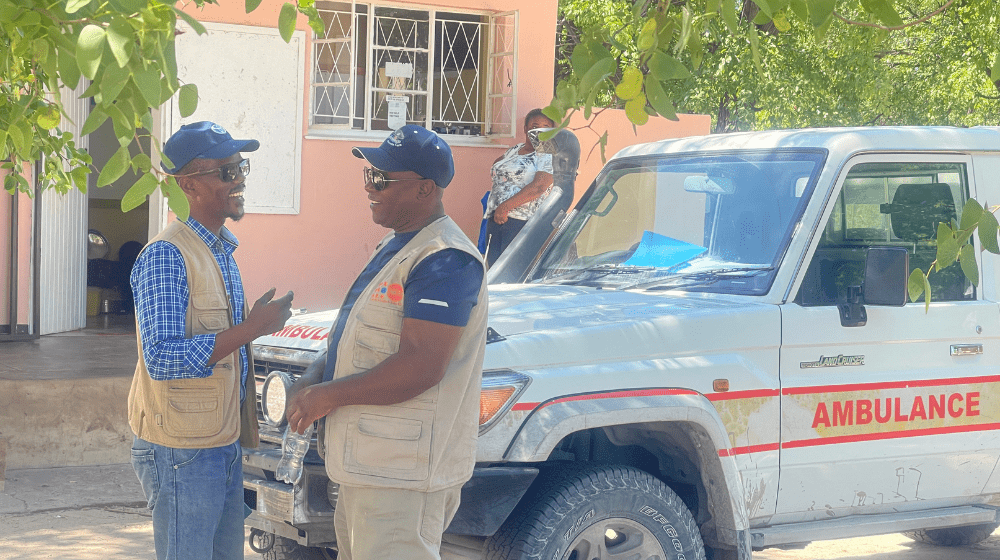Maun, Botswana - In the small remote village of Mababe, Nurse Lorato Dambe faces a host of challenges daily; shortage of commodities, delayed transportation of lab samples and getting patients’ results timely. Mababe Health Post is about 116 km from Maun, where the major referral hospital and laboratory services are. The road terrain is so rugged that it can take about three or more hours to drive from Mababe to Maun, and during rainy seasons, the road is totally inaccessible due to flooding. This is an area with a high concentration of wildlife, as the drive from Maun to Mababe offers one a free game drive, passing herds of elephants, hippos and other animals along the way. This also makes it quite a dangerous territory and restricts movements.
“We draw blood in this area on Tuesdays for patients from Khwai and Mababe. The ambulance then collects our samples and proceeds to collect more samples from Sankoyo, another health post along the way, and thereafter delivers them to Maun. The samples have to arrive at the lab in Maun before 1100am, but that’s not always possible due to the distance and difficult road conditions, leading to possible contamination of samples,’’ explained Nurse Dambe.
These challenges are not unique to Mababe, they are experienced throughout the North West and the Okavango districts, which have some of the remotest and inaccessible places in the country. These multiple challenges propelled the Ministry of Health to widen the scope of the Drones for Health initiative and expand it from the pilot region of Palapye to cover more villages in these two districts including Gudigwa, Xai Xai, Nxauxau, Khwai, Kareng, Somelo, Qangwa, Seronga, Beetsha and many more.
The need for speed
The Drones for Health project aims to overcome these challenges, by reducing delivery times that clinic officials say normally take hours to minutes, meaning that essential medical supplies could arrive in time to save lives.
When you get your blood drawn, or give a urine/cough sample at the health post, testing is not done at the same location. Health posts, and even clinics, are primarily collection sites that do not perform any key tests. Therefore, samples require to be moved to labs.
"Speed is everything," said Nurse David Selemogwe of Somelo Health Post, another remote village in the district. "If samples sit there for a long time, at some point the specimen starts deteriorating. It's not so useful anymore."
Between 25 and 40 per cent of all temperature-sensitive medical supplies sent from urban centers to rural health clinics are wasted because of an unreliable cold-chain infrastructure. Rural clinics are also often subject to stock outs, and patients in need of specialized blood medical products, drugs and other supplies are unable to acquire them. The Drones for Health project aims to address the issue of access to medical supplies, largely leapfrogging traditional modes of transportation and various obstacles.
New technology solutions are critical for the future sustainability of the health sector, and the utilization of drones is part of the answer. The Ngami District Health Management Team (DHMT) coordinator, Dr Sandra Maripe-Ebutswe said the innovation provides an excellent opportunity to improve the efficiency of supply chains, in particular the transportation of blood and other time sensitive laboratory samples.
She further said the project would accelerate health care delivery to hard to reach areas as well as address disparities that existed at low-tier health care facilities.
“The drones will improve health care delivery as they will address terrain constraints and challenges of limited resources such as vehicles,” she said, adding that it would as a result reduce preventable deaths and improve logistics and supply chain management.
Communities, she said, would also benefit from the project as they would have access to quality health services in a timely manner.
The need for rigorous community engagement
Gotang Mmala (33), mother of twin babies, says when the word “drone” is mentioned, most people think of things that fly over their heads and spray poison to kill them. Other community members like Mr. Therisano Mogodu (48) associates drones mostly with anti-poaching or the government spying on those who hunt illegally. The two districts are largely a wildlife/tourist destination, and the dwellers mostly survive by hunting and fishing.
Interviews with the villagers show that there is rigorous need for community engagement and information dissemination to allay any fears that the community might have towards this new innovation.
Shifting from funding to financing
UNFPA has been the technical partner for the Ministry of Health throughout the project and provided seed funding for the initial pilot Phase 1. Through rigorous resource mobilization efforts, UNFPA Botswana has managed to mobilize $50,000 in 2022 from the Strategic Investment Facility (SIF), under the ideation concept, and a further $1,450.000 in 2023 (spread in three years) under project implementation. This catalyzed and unlocked a greater sum of domestic government resources, as the Ministry of Health (MoH) allocated the sum of $1,600.000 for implementation of the second phase of the project.
UNFPA over the years has made significant efforts to support Governments in accessing sustainable development financing and increasing domestic resource allocations for their own development goals. Building on this work, the country office will continue to mobilize for resources to develop a steady pipeline of investment-ready catalytic projects for attracting and channeling greater public-sector and private investments towards UNFPA’s supported programs in sexual and reproductive health and rights and gender equality.
~Priscilla Rabasimane


